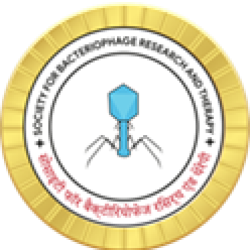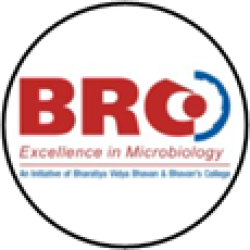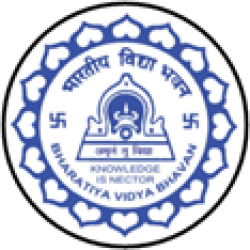
The Society for Bacteriophage Research and Therapy was established in 2017 and officially registered on December 19, 2018. Its primary goal is to explore the applications of bacteriophages, particularly in combating antimicrobial resistance (AMR), and to promote their use as effective treatments for drug-resistant infections. The society serves as a platform for researchers to collaborate with phage scientists, offering both annual and lifetime memberships, with over 85 current members, 70 of whom are lifetime members. By bringing together scientists, academicians, and clinicians engaged in basic and translational research on bacteriophages, the society aims to leverage collective expertise and resources at both national and international levels. Members conduct research on various aspects of bacteriophages, including their prevalence in water sources and sewage treatment, as well as their clinical applications such as antibacterial agents, vaccines, gene therapy vectors, diagnostics, and drug delivery systems. Recognizing the urgent need to address the slow pace of drug discovery for infectious diseases and the growing threat of AMR, the society organizes technical conferences, seminars, and workshops across the country to bridge the gap between theoretical knowledge and practical implementation among students and research scholars. Additionally, the society acknowledges the contributions of its members by awarding Young Scientist Awards, early career research awards, and Editorial team memberships for their significant research in phage therapy. To further enhance scientific learning through research, the society has established the International Journal of Bacteriophage Research, which publishes annually in January. The journal maintains high standards and quality publications through expert peer review, covering a wide range of topics including reviews, research papers on bacteriophage-related subjects, genetic engineering of phages, in vitro and in vivo experiments, and molecular screening of phages.

Bhavan’s Research Center is a trusted partner for routine and specialized Microbiological testing and research projects. Established in 2005 in Andheri, Mumbai, Bhavan’s Research Center is the brainchild of the Department of Microbiology at Bhavan’s College, mentored by the esteemed S.P. Jain Institute of Management and Research. With a focus on water, hygiene, cosmetics, food, and environmental microbiology, Bhavan’s Research Center has established itself as a reliable institution, offering a comprehensive range of quality services.
Accredited by the National Accreditation Board for Testing and Calibration Laboratories, Bhavan’s Research Center adheres to ISO/IEC 17025:2017 standards, ensuring excellence and competency in handling testing needs across specialized fields.
Bhavan’s Research Center (BRC) conducts diverse research, spanning critical areas such as water and food safety, pathogen surveillance in various products, microbial risk assessment, and antimicrobial resistance (AMR) studies. Additionally, BRC investigates the effectiveness of disinfectants, evaluates water treatment technologies, and explores applications of bacteriophages in bacterial control.
As one of the premier laboratories in the country, also empanelled by Bureau of Indian Standards as a laboratory of national repute and eminence in Microbiology; Bhavan’s Research Center is well-equipped to meet diverse project requirements, particularly in the area of water and hygiene-associated products. It adopts a consultative methodology towards its research initiatives, through ongoing interactions with industry stakeholders and regulatory bodies. Leveraging information from the public domain, BRC identifies gaps in knowledge and methodology, and meticulously plans both internal and external research projects to address these gaps. Through these activities, BRC continues to make significant strides in advancing scientific knowledge and contributing to various fields of microbiological research, with a focus on addressing critical challenges in water, hygiene, food safety, environmental health, and antimicrobial resistance.
BRC is working on several important projects involving use of bacteriophages to control harmful bacteria and as a pathogen monitoring tool especially in wastewater treatment.
• It executed a project during COVID-19 period in the area of wastewater based epidemiology of SARS-CoV-2, assessing prevalence and correlation with clinical cases in Mumbai city.
• A correlation between FRNA Bacteriophages and SARS-CoV-2 RNA in the wastewaters of Mumbai city has been studied to establish if the FRNA phages can be used as a tool for routine monitoring of SARS-CoV-2 virus.
• Bacteriophage MS2 has been recommended by WHO, EPA & BIS as an indicator for presence of pathogenic virus in drinking and field water. So far, there was no data from India on occurrence of MS2 in wastewater to align this recommendation. A project was undertaken, to check the occurrence of F‐Specific bacteriophages in untreated and treated wastewaters in Mumbai, wherein persistence of MS2 was observed, confirming its correlation as indicator phage.
• One of the major projects focused on isolating and characterizing bacteriophages from wastewater to target harmful bacteria such as E. coli, Salmonella spp., Shigella spp. The research involved identifying effective phage hosts, purifying phages, and optimizing their infectivity to reduce these pathogens. The study aimed to apply a mixture of selected bacteriophages to demonstrate their potential to reduce these pathogens under lab conditions.
• Another project involved isolating the pathogenic hosts and their corresponding phages and identifying phages with broad spectrum host lysis potential. It also characterizes the phages with potential lytic properties for their genetic make-up to decide on their suitability for environmental applications.

The University of Mumbai holds a distinguished position as one of India's oldest and foremost educational institutions. Established in 1857 following the "Wood’s Education Dispatch," it stands as one of the country's inaugural three universities. Recognizing its academic excellence, the University of Mumbai was honoured with a 5-star status in 2001 and an 'A++' grade status in April 2017 by the National Assessment and Accreditation Council (NAAC).
Bhavan's College was established in 1946, a year before India gained independence from the British in 1947. The college was instituted under the educational trust of Bharatiya Vidya Bhavan instituted in 1938 by Shri K.M. Munshi, an eminent independence movement activist, educationist, politician and writer. The college is located in Andheri west, a neighbourhood in western Mumbai. It is built upon 45 acres of land and has volleyball and basketball courts, football pitches, a botanical garden, a lake, a nature adventure centre, and a Lord Shiva temple within the campus, besides housing other eminent institutions such as SPCE Engineering College, SPIT College of Engineering, SPJ Institute of Management and Research and Wadia School.
Bhavan’s College caters to more than 10, 000 students offering higher secondary (junior college), undergraduate (bachelor's) courses, postgraduate and PhD programs.
The College provides an atmosphere conducive to multifaceted development to the students, encouraging them to explore their potential in the pursuit of excellence. This ethos thrives within a holistic, student-centric environment, where the talents, skills, and abilities of everyone are identified, nurtured, and encouraged to flourish. With the College being conferred the status of ‘Autonomy’ by UGC, the apex educational body of India since 2020, it has grown from strength. Students are offered platforms to engage in critical thinking, expression, and skill demonstration, empowering them to tackle various challenges with guidance from facilitative educators and also through multiple new programs.
While maintaining a focus on academic excellence, the College is equally committed to preparing students for life beyond academia, equipping them to confront future challenges and fostering a sense of social relevance. This guiding ideology permeates all aspects of the institution, ensuring that students grow to their full potential and emerge as capable individuals ready to assume responsibilities across diverse spheres of life.

The Department of Microbiology is affiliated with the University of Mumbai and was established in the year 1956. It is the second Department in Maharashtra to introduce the subject of Microbiology in the Undergraduate program. The Department initiated the postgraduate program “MSc by Papers/Dissertation” in 1972 seeking approval from the University of Mumbai. Currently, the Department offers BSc, MSc and a Doctor of Philosophy [Ph.D.] programs for its incoming students. The Department studies and disseminates knowledge in broad areas of Microbiology like Microbial cell structure & growth, Microbial physiology & biochemistry, Microbial genetics, Symbiosis, Pathogenesis, Immunology, Biotechnology, and Industrial, Cosmetic, and Pharmaceutical Microbiology. Students completing and passing out from any of our programs go on to take jobs in different fields like the biotechnology sector, pharmaceutical sector, food & dairy industries [QA/QC], health care, scientific writing, and scientific research at various industries, academic and government institutions across the country. Department of Microbiology is spearheading three key projects on bacteriophage in the area of environment and dairy. • The first project involves isolating bacteriophages from dynamic environments, characterizing their morphology, genetics, and functional properties, and demonstrating their effectiveness to significantly reduce harmful bacteria in domestic wastewater from Sewage Treatment Plants (STPs), and improve effluent water quality as a safe, sustainable, and precise alternative to conventional wastewater treatment processes. • The second project aims to address pollution challenges in wastewater treatment plants (WWTPs) caused by increasing urbanization, which have become hotspots for antibiotic-resistant bacteria like Escherichia coli. Aiming to reduce chemical disinfectant use during the tertiary treatment process, this project focuses on developing a robust, cost-effective phage delivery system using environmentally friendly carriers to immobilize phages, targeting multi-drug resistant E. coli in WWTPs. • In contrast to using phages for biocontrol, the third project focuses on the challenges posed by phages as potential contaminants in manufacturing facilities, particularly in dairy fermentations. Phages can disrupt fermentation processes, leading to reduced productivity and compromised product quality. Our research aims to develop effective strategies to mitigate these disruptions, ensuring consistent and efficient fermentation in the dairy industry.
* Bhavan’s Research Center (BRC), was established in 2005, under the aegis of Bhartiya Vidya Bhavan, a public Charitable Trust registered under The Bombay Public Trust Act 1950 (BOM XXIX) with Registration No. F-358 (BOM dated 12-06.1953), having its registered office at Munshi Sadan, Kulapati K. M. Munshi Marg, Chowpatty, Mumbai 400 007.
Designed, Developed and Managed by The SMM Hub